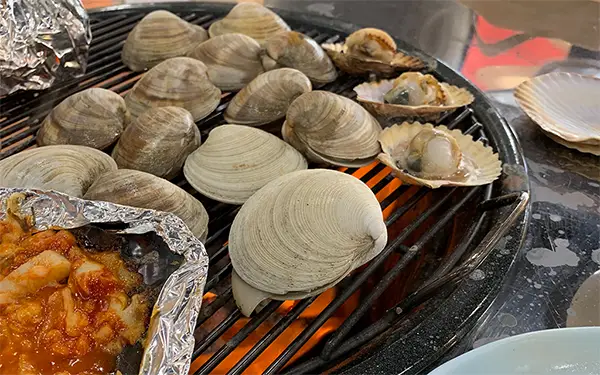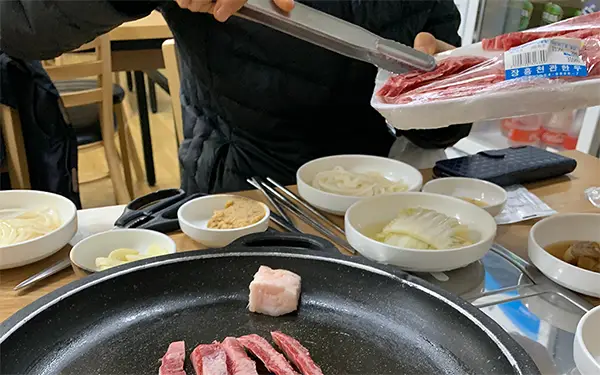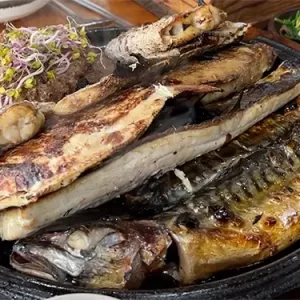3 Easy Ways to Add Flavor
Brining, curing, and marinading before grilling adds flavor, tenderizes, and also enhances the natural flavor of the ingredients.
- Brining is soaking an ingredient in a salt solution to add moisture, tenderize and enhance the natural flavor.
- Curing/dry brining is when salt is rubbed onto the surface of an ingredient to enhance the flavor, make a firm texture, and help the ingredient retain moisture.
- Marinading is submerging or coating an ingredient into a mixture of seasoning ingredients to add flavor, remove smells, and tenderize.
Brining
Brining is a preparation method that involves soaking your lean protein (shrimp, lean pork, poultry, and octopus) in a saltwater mixture. This method helps to tenderize, enhance the natural flavor, and add/retain moisture which makes a juicer texture.
The ratio for a brine is 1 tbsp coarse salt to 1 cup of water. You need to make enough to submerge the lean protein fully.
When making a brine, the ratio is:
- 1 tbsp coarse salt (천일염): 1 cup of water (15 ml coarse salt (천일염): 237 ml water)
You can add different whole spices or citrus to your brine to add more flavor.
When you brine your lean protein, there are some rules you need to follow to do it correctly. The most important thing is to not oversoak your ingredient, or it will ruin the texture and make it mushy and weird when cooked. The best rule of thumb is to soak 1 hour for every pound of protein. Oversoaking cannot only ruin the texture but also make the ingredient dry, so keep to this time frame.
Soaking Timeframe:
- For every pound of protein, you soak the ingredients for 1 hour. For example, 4 pounds of chicken will be soaked for 4 hours.
Oversoaking will make the ingredient mushy and dry.
After the protein is done brining, you can take it out of the brine and pat off the excess liquid with a paper towel before using it. You don’t need to wash the lean protein with water after brining it.
Curing
Curing is spreading a layer of coarse salt onto a protein like whole fish and letting it sit for as little as 20 minutes to overnight before patting off the salt and moisture and then grilling. When curing, add enough salt to cover the fish in a thin layer, do not completely smother the fish in salt. Curing makes the texture of the protein firmer, helps to retain moisture in the protein, enhances the natural flavors, and makes the color of the fish more vibrant. I always cure my first before grilling because it makes it much more delicious and evenly seasoned.
After curing your fish, you must dab the salt and moisture off the surface of the protein with a paper towel to remove the excess salt and dry off the surface of the fish before grilling. It is important that your rub off as much salt as possible before grilling, or it will be overly salty. Do not run the fish under water to remove the salt because we still want it to have a seasoned flavor.
Curing Guide:
- The general rule of thumb is 1/2 tsp salt per pound of meat.
Marinading
Marinading is fully submerging your ingredient into a seasoned mixture and letting it sit for some time to add flavor, remove unwanted smells, preserve moisture, and tenderize.
Marinades are versatile and can be added to different proteins or vegetables. You can add your desired flavor to a number of things just make sure that when you make a marinade, you want to coat or submerge your ingredient in that marinade completely. An easy way to ensure this is to add the marinade to the ingredient in layers. Marinade – ingredient- marinade -ingredient. Always marinade your ingredients in the fridge at a safe temperature.
Marinades only penetrate the outer layer of a protein. You only really need to soak your ingredients for 30 minutes to have a fully marinaded ingredient. You can soak from 30 minutes to 24 hours if you want.
If you are marinading something for a longer time, be careful of how much salt you add to your marinade because it can suck out the moisture or make the texture of your ingredient weird. Use less salt in your marinade if you plan to marinade your ingredient for a longer amount of time.
Ingredients Used in Marinades
There are reasons we add certain ingredients to our marinades other than for flavor.
Acids like lemon or vinegar help to tenderize the protein and can also remove any unwanted natural aroma from fish. Alcohol (미림, 청주, 소주) can help to remove any aroma from ingredients like fish as well. Grated pear can act as a natural tenderizer and sweetener if you are trying to use only natural sweeteners. Whole spices are used in a marinade because they gradually release their flavoring as the ingredients marinade. Oil in a marinade can help preserve moisture, and depending on the oil you use, oils like sesame oil can add a nutty flavor and aroma.
As you can see, there are various benefits to adding certain ingredients to your marinades. In this section, I will break down some popular Korean marinading ingredients and explain how they are beneficial.
Ingredients used to add Sweetness:
Sugar in marinades helps to enhance flavor, remove bitterness, and ensure a nice browning on the protein once it’s cooked.
- White sugar (설탕) adds a clean flavor without altering the taste.
- Grated Pear or Apple (배/사과) adds a natural sweetness and delicate taste.
- Jocheong (조청): adds a rich flavor and enhances the umami flavor. This syrup is less sweet. It has a savory flavor, in my opinion.
- Rice Syrup (쌀엿) is a thick brown rice syrup that adds a light-colored sweetness. If you add too much to your marinade, it can create a sticky texture.
- Mulyeot (물엿) adds a clean flavor and shine to foods. It is less thick than 조청.
- Brown sugar (흑설탕) adds a unique sweet flavor and dark color.
- Honey (꿀) adds a unique flavor and smell to your dishes.
Ingredients used to add Aroma and Flavor:
- Sesame oil (참기림) has a strong toasted nutty, savory flavor and aroma. Adding fat to your marinades allows the ingredient to brown well when cooked.
- Whole black pepper (후추) adds depth and enhances the savory flavor of recipes. Whole spices are used in a marinade because they gradually release their flavoring as the ingredients marinade.
- Ginger (생강) adds a spicy aromatic taste, sweet-spicy tang, and fresh aroma.
- Garlic (마늘) adds an earthy flavor and aroma.
- Green onion (파) adds color, onion umami flavor, and a good aroma.
Ingredients to add Salt:
Salt in marinades helps to tenderize the protein and enhance the natural flavor.
- Dark soy sauce (진간장) has a darker color, lower salt content, and sweet flavor.
- Seasoned soy sauce (맛간장) adds salt, plus other ingredients like onion, seaweed, mushroom, meat, or fruit.
- Salt (꽃소금) enhances flavor without changing color or texture.
Ingredients used to Tenderize:
Adding acids to your marinade help to tenderize your proteins.
- Grated pear (배/사과 (sub)) has enzymes that can help tenderize meats by breaking down the meat fibers.
- Grated onion (양파) contains enzymes that tenderize, plus it adds flavor.
- Mihyang (미향) is similar to mirin with vinegar. It is used to tenderize meat.
- Mirin (미름), when used in marinades, can make the meat firmer. The acid in this alcohol helps to break down muscle fibers and tenderize meat.
- Soju (소주) has a strong alcohol content which helps to tenderize quickly, plus it adds a unique flavor.
Ingredients used to Remove Smells:
If you want to remove smells from naturally strongly scented protein like duck, you can use these ingredients.
- Mirin (미름) removes fish or meat smells. It also enhances the umami flavor of your ingredient.
- Cheongju (청주), when combined with mirin, can remove meat and fish smells. The smell is removed when the alcohol is burned off. It does not have any sweet taste.
- Soju (소주) removes odor from meat and fish.
- Perilla seed oil (들기림) removes the natural fish smell
- Brown rice vinegar (현미식초) removes the natural seafood smell
- Fermented grain vinegar (환만식초) has no scent. It removes the natural smell from fish.





